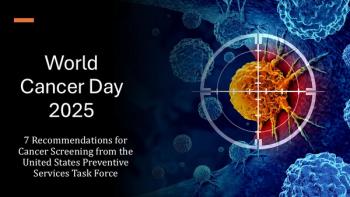
A family medicine specialist who works with cancer survivorship highlights findings of a study that illustrate how effective screening is and how treatment has changed.

Unnecessary Cancer Screenings in the US Persist Long After Guidelines Shift: Daily Dose

A family medicine specialist who works with cancer survivorship highlights findings of a study that illustrate how effective screening is and how treatment has changed.

World Cancer Day 2025 urges focus on the unique personal journey underlying every cancer diagnosis; individual recommendations for regular screening is where that can start.

Your daily dose of the clinical news you may have missed.

Researchers observed substantial disparities in burden by cancer type, age group, countries/territories, and a country's level of Human Development Index.

Over 4 million cancer deaths have been reverted since 1991, but new cancer cases are estimated to reach over 2 million, according to new data from an annual American Cancer Society report.

An array of new tools, perspectives, and guidelines to help navigate the gray areas have been reported in recent days.

Wanted: Physicians who will interact with patients the way a good financial counselor would.

A range of options for metastatic castration resistant prostate cancer offer benefits, but impact on survival and sequencing guidance are less than optimal.

Risk does not go up with exposure to testosterone therapy over a 5-year period or according to total testosterone injections.

The goal is to avoid treating men who don’t need surgery or radiation. A new long-term study points to the potential of surveillance as a treatment option.

Lethal prostate cancer is less-not more-likely to develop in patients with asthma. The Health Professionals Follow-up Study answers key questions about why.

Three factors may help physicians identify older men who are unlikely to benefit from aggressive therapy, and other prostate cancer news.

A video series from James Mohler of Rosweel Park Cancer Institute on PSA testing in the wake of changing guidelines from the US Preventive Task Force.

James Mohler, MD, Roswell Park Cancer Institue, discusses risk factors for prostate cancer.

James Mohler, MD, Roswell Park Cancer Institute, defines who is at risk for prostate cancer, how to decide who should be screened, and how to talk to patients about the test and their results.

James Mohler, MD, of Roswell Park Cancer Institute, points out the flaws in the TaskForce analysis.

Roswell Park Cancer Institue's James Mohler, MD, on the risks of PSA screening

James Mohler, MD, Roswell Park Cancer Institute, responds to recommendations from the US Preventive Services Taskforce to limit PSA testing by pointing out the benefits.

RPCI's Dr Mohler offers advice on following new guidelines for prostate cancer screening

Marc B. Garnic, MD, addresses these questions in this short video. Dr Garnic, who spoke on this topic at the 2011 American College of Physicians meeting in San Diego

Looking at contemporary medicine’s complex landscape, especially in regard to soaring costs, can make practitioners dizzy. For example, if primary care physicians were asked whether it is cost-efficient and reasonable to screen with prostate-specific antigen (PSA) measurement for early-stage prostate cancer in men with terminal pancreatic cancer or to perform colonoscopy for early diagnosis of colon cancer in women with stage IV lung cancer, the answer would be a quick and uniform no. Unfortunately, a recent publication suggests that in the real world the answer has been yes, as disturbing and wasteful as that may be.

Benign prostatic hyperplasia (BPH)-histologically defined as stromal and epithelial hyperplasia beginning in the periurethral transitional zone of the prostate-affects up to 80% of 80-year-old men.[1,2] With progressive prostatic enlargement, bladder outlet obstruction can result. Although the exact mechanism is unknown, lower urinary tract symptoms (LUTS) can signal progressive BPH.

To screen or not to screen? The answer is not straightforward when it comes to prostate cancer. Recently updated guidelines from the US Preventive Services Task Force (USPSTF) recommend against prostate- specific antigen (PSA) screening in men who are 75 years and older and state that there is insufficient evidence to confirm whether screening is beneficial-or harmful -to men younger than 75 years.1,2 The recommendations are summarized in the Table.

BOSTON -- Older male clinicians are more likely than others to order inappropriate prostate specific antigen (PSA) tests, researchers here said.

ANAHEIM, Calif. -- Testosterone levels appear to have a major influence on PSA values and may warrant watching for patients at high risk of prostate cancer, a large screening program suggests.